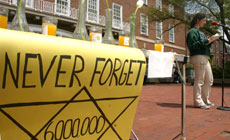Campus remembers Holocaust victims

Online Poster
May 4, 2005
Last updated on May 11, 2016 at 09:08 p.m.
Jewish victims of the Holocaust were honored Tuesday with a reading of victim’s names on the Quad to commemorate Yom Hashoah: Holocaust Remembrance Day.
Yom Hashoah, which will begin tonight and last until Thursday evening, was declared a national holiday in Israel in 1961 and is celebrated by Jewish communities across the world.
Members of the Hillel Leadership Committee, a Jewish foundation, took turns to read names out loud between 11 a.m. to 3 p.m. to honor the six million victims killed.
“I am actively involved in Hillel,” said Lindsey Epstein, one of the readers and freshman in LAS. “I think it’s really important to be involved.”
Get The Daily Illini in your inbox!
On a nearby table, six flowers were placed next to six burning candles that represented the six million victims killed.
The Holocaust, the Greek meaning for “sacrifice by fire,” was the systematic murder of millions of Jews under the Nazi regime headed by Adolf Hitler, according to a handout from Hillel. Men, women and children killed in the Holocaust came from France, Poland, the former Soviet Union, Germany, Austria and many other European countries. Sixty years after the Holocaust, the memory of the victims and the suffering of the Jews live on.
“Yom Hashoah is a day designated to remember the victims and what they gave up and what they have taught us,” said Shoshana Hindin, education committee chair for Hillel and senior in LAS. “It will be sad if all those people and everything they went through is forgotten.”
For over 80 years, Hillel has been the foundation for students of Jewish background on campus to celebrate Jewish life and history. The Hillel committee at the University participates in this event every year, according to the Hillel Web site, to try to educate people about the horrors of the Holocaust.
Hindin said a museum in Israel has a database of all the names of those killed, which takes up more than 80 pages.
Meredith Rohter, sophomore in LAS, said it is important to remember what happened.
“If we forget, it’s more likely to happen again,” Rohter said.
Hindin said the holiday should not be seen as just part of Jewish history, but as a warning for future generations.
“(Yom Hashoah) is a reminder of what could happen in the world and that it could happen to anyone,” Hindin said.





